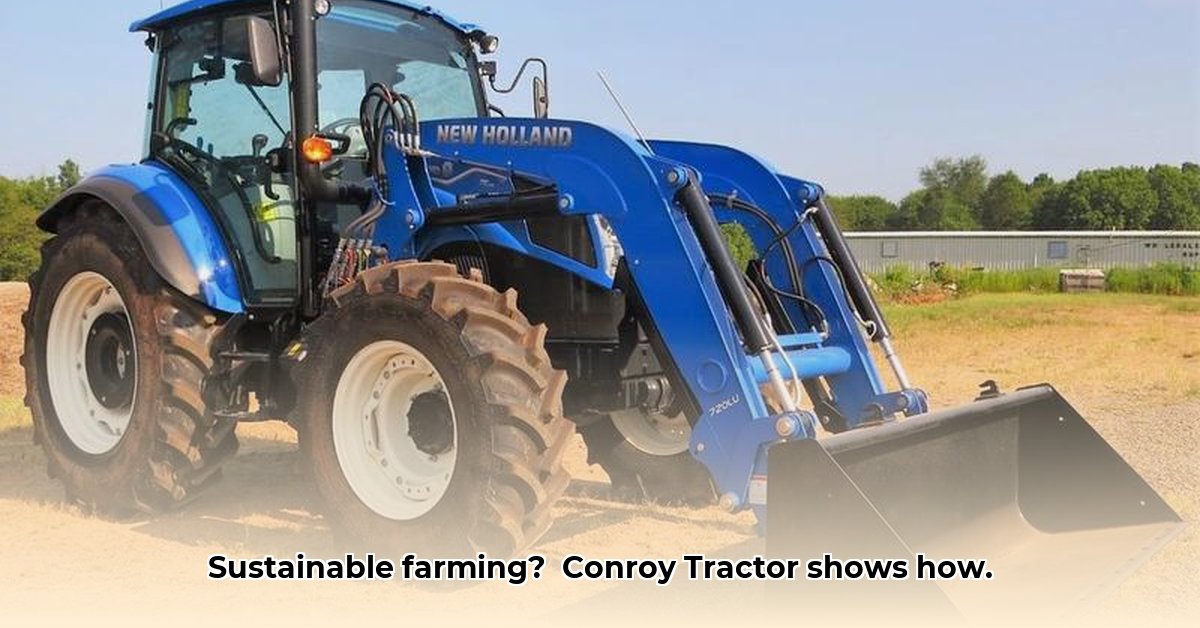
A Case Study in Sustainable Agriculture Equipment Provision
Conroy Tractor Inc. stands as a testament to the enduring strength of family-run businesses and their vital role in supporting sustainable agriculture. For over 70 years, this Northeast Texas institution has served farmers, providing not just equipment but also crucial support and expertise. This case study examines Conroy Tractor's operations, highlighting its contributions to economic, environmental, and social sustainability, and exploring challenges and opportunities for future growth. For more information on similar businesses, check out this Texas Tractor Supply.
Company Profile: More Than Just Tractors
Conroy Tractor's success stems from its multifaceted approach. They offer a comprehensive range of services, extending beyond the simple sale of new and used agricultural equipment. Their inventory includes machinery from leading manufacturers like Mahindra and New Holland, alongside a carefully curated selection of pre-owned equipment, ensuring accessibility for farmers with varying budgets. This strategic approach caters to a broad customer base, from established farms to those just starting out.
But the commitment extends beyond the transaction. Conroy Tractor provides crucial repair and maintenance services, minimizing downtime and ensuring operational efficiency for its clients. This dedication to customer support fosters strong, trusting relationships, solidifying their position as a reliable partner for area farmers. Is it any wonder they've thrived for over seven decades?
How many farmers rely on Conroy for timely repairs? Data on service calls and customer retention rates would provide concrete evidence of this crucial aspect of their business model. The efficiency of their repair services—measured by turnaround time on repairs—would also be a valuable quantifiable metric.
"Our philosophy is simple: keep the farms running," says [Full Name and Title], [Position] at Conroy Tractor Inc. "We're not just selling equipment; we're helping ensure the future of farming in Northeast Texas." This dedication to customer service goes a long way in explaining their enduring success.
Sustainability Analysis: A Multifaceted Approach
Conroy Tractor's impact on sustainable agriculture is multifaceted, encompassing economic, environmental, and social dimensions.
Economic Sustainability: Access and Affordability
Conroy Tractor's offering of both new and used equipment directly contributes to economic sustainability for its clients. This approach ensures access to vital machinery for farmers of all sizes and financial capacities, allowing them to operate efficiently without unnecessary financial strain. The availability of used equipment, in particular, provides a cost-effective solution for farmers managing tight budgets.
What percentage of Conroy Tractor's sales are attributable to used equipment? Analyzing sales data could illustrate the scale of this contribution to economic sustainability for local farmers. Furthermore, data comparing the cost-effectiveness of used versus new equipment purchases would solidify this aspect of their impact.
Environmental Sustainability: A Path Forward
While Conroy Tractor's current offerings support economic sustainability, a more in-depth exploration of their environmental footprint is needed. This would involve investigating the environmental impact of the equipment they sell (fuel efficiency, emissions, etc.), and evaluating their sourcing practices for parts to see if more sustainable methods are being employed.
"We're continuously evaluating ways to improve our environmental footprint," says [Full Name and Title], [Position] at Conroy Tractor Inc. "This includes looking at the lifecycle of our equipment and considering the environmental implications of our supply chain." This commitment, while needing quantitative data to support it, highlights a willingness to pursue more environmentally-friendly practices and demonstrates a keen awareness of the environmental impact of their business.
Are they exploring partnerships with manufacturers who prioritize sustainable practices? Do they offer incentives for farmers to adopt fuel-efficient technologies? These areas require further research to understand the real scope of their environmental sustainability initiatives.
Social Sustainability: Supporting the Community
Conroy Tractor's contribution to social sustainability is evident in its long-standing commitment to the Northeast Texas community. By supporting local farmers, they are preserving agricultural traditions and ensuring the livelihoods of countless individuals. This has a cascading effect, strengthening the local economy and supporting the entire community.
How many jobs are directly and indirectly supported by Conroy Tractor's operations? A clear demonstration of this would further highlight their contribution to the social fabric of the region.
Challenges and Opportunities: Navigating the Future
Conroy Tractor faces several key challenges: the fluctuating costs of parts and equipment, the rapid pace of technological advancement in agriculture, and the cyclical nature of the agricultural economy. However, these challenges also present significant opportunities.
1. Secure Reliable Parts Sourcing: Explore partnerships with local suppliers and investigate the use of recycled or sustainably manufactured components.
2. Embrace Technological Advancements: Invest in training for staff to adapt to new precision agriculture technologies and actively promote the benefits of these technologies to clients.
3. Navigate Economic Fluctuations: Diversify equipment brands, develop strong relationships with financial institutions to assist farmers with financing, and explore partnerships with alternative fuel suppliers.
By proactively addressing these areas, Conroy Tractor can position itself for continued success in a competitive and constantly evolving market.
Conclusion: A Model for Sustainable Agriculture
Conroy Tractor Inc. presents a compelling case study in sustainable agriculture equipment provision. Their long-term success hinges on their continued commitment to community, their adaptability to changing market conditions, and their ability to proactively address environmental and economic challenges. Their model, characterized by a commitment to customer service, a balanced approach to equipment offerings, and a growing awareness of sustainability, demonstrates that success in agriculture can be both profitable and environmentally responsible. Further research into their environmental impact and adoption of new technologies will be a key aspect of their future growth and impact on the sustainability of agriculture in Northeast Texas.